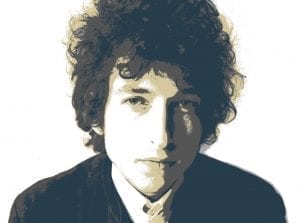“Hey Ma, I wanna be a rock ‘n’ roll Nobel Laureate.”

Bob Dylan’s last-minute acceptance of the 2016 Nobel Prize for literature appeared to stump him as much as it stunned the world literary establishment. In his acceptance lecture, he begins, “When I first received this Nobel Prize for Literature, I got to wondering exactly how my songs related to literature. I wanted to reflect on it and see where the connection was.” And connect he did . . . in a “roundabout” way. He described how the literature he absorbed as a youngster gave rise to his artistic themes over a lifetime.
Then this year for 2017 the Swedish Academy (who awards the prize) seems to have made a course correction after the brouhaha created by granting the award to a musician. Novelist, Kazuo Ishiguro, (Remains of the Day), a ‘real writer’ was awarded the 2017 Nobel for literature. And the people at the book clubs are again sedate. Little known fact . . . Ishiguro has actually composed jazz lyrics.
But now that the smoke is cleared, it is fascinating to note that much of the commentary on Dylan’s award probed what the award meant for Dylan and what the award meant for the Nobel Prize and what the award meant for literature. But what the award signals for our culture’s perception of music itself . . . not so much. And there remains a slight hangover nervously suggesting that Stockholm is never as far away from Nashville or Memphis as it used to be.
So wherein is a song now “literary”? It could have been argued that the lyrics are literary and it was the penned words on paper that produced the prize. But the Swedish Academy has, to be sure, opened that door to a melody. It would be one thing for the Noble Committee to award Dylan the prize for literature citing that he had created “new poetic expressions.” There has been plenty past “poetic” expressions winning the prize But Dylan’s citation reads: "for having created new poetic expressions within the great American song tradition." For the first time since the prize was awarded in 1901, the Academy cites songs. The Academy is singing a new tune. As an historical turnabout, this would be something like awarding a Grammy to Annie Dillard because her poetry can wax lyrical.
One of the criteria for the literary prize seems to be an estimation of the timelessness of the art that is nominated. Dylan, again in his acceptance address, describes as a seventeen-year-old a long trip he set upon to see Buddy Holly perform a few days before Holly was killed:
“Everything about him. He looked older than twenty-two. Something about him seemed permanent, and he filled me with conviction. Then, out of the blue, the most uncanny thing happened. He looked me right straight dead in the eye, and he transmitted something. Something I didn't know what. And it gave me the chills.”
Dylan’s take is that something supernatural was bequeathed to him, the capacity to be permanent. And it is the Swedish Academy in our culture who claim to be the guardians of permanence, the cultural gatekeepers. So, this causes a question to pop. Who are these movers and keepers and why did they do it?
Not just anyone can nominate for a Nobel prize. One has to be invited by the Academy to make a nomination. Only a select group of “qualified” people may be invited to nominate an artist for consideration. The “select” are previous laureates, literary critics, writers and academics, the crème de la crème. The Swedish Academy then grants the award. The deliberations are not public. The names of the lists of runner ups are kept secret for fifty years. The “select” are hardly those one would think would select a Mr. Dylan. His music and persona embodied cultural upheaval during the last century; his being awarded the Nobel Prize for literature in song potentially embodies another upheaval in this century. Could it be a cultural admission about the new power of song, itself?
It is a rarified company that Dylan now inhabits. Solzhenitsyn, Churchill, Hemingway, Sartre and so many others all of whom never a guitar string plucked nor an ivory key tickled. So, who is next? Bill Wyman writing in the New York Times opines, “In truth, the only other pop artist with work as timeless as Mr. Dylan’s is Chuck Berry.” Really? What about rap and the mad poets of hip hop? And alas, Chuck is no longer with us and the Prize is never awarded posthumously. Chuck, no doubt, could have used the money.
Either way a cultural bar has been hurdled. And to quote Dylan’s lyrical juice from back in 1965: “You’re very well read. It’s well known. But something is happening here and you don’t know what it is. Do you Mr. Jones?” - “Ballad of a Thin Man
You can read and hear Bob Dylan’s Noble Prize Lecture at nobelprize.org.




